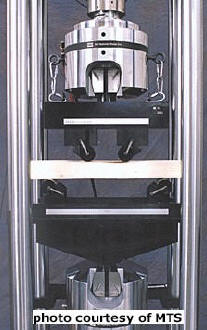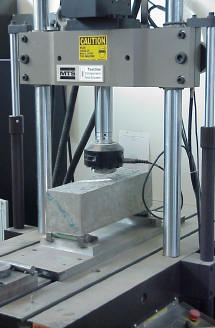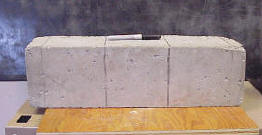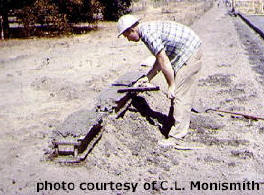Flexural strength (sometimes called the modulus of rupture) is actually a measure of tensile strength in bending. PCC flexural strength testing is carried out on a 40 x 40 x 160 mm (1.57-inch x 1.57-inch x 6.30-inch) cement mortar beam. The beam is then loaded at its center point until failure.
Flexural strength is typically used in PCC mix design for pavements because it best simulates slab flexural stresses as they are subjected to loading. Because the flexural test involves bending a beam specimen, there will be some compression involved, and thus flexural strength will generally be slightly higher than tensile strength measured using a split tension test. Usually, mix designs are typically tested for both flexural and compressive strength; they must meet a minimum flexural strength, which is then correlated to measured compressive strengths so that compressive strength (an easier test) can be used in field acceptance tests.
There are two basic flexural tests: the third-point loading (Figure 1) and the center-point loading (Figure 2). For maximum aggregate sizes less than 50 mm (2 inches), each test is conducted on a 152 x 152 x 508 mm (6 x 6 x 20 inch) PCC beam (see Figures 3 and 4). The beam is supported on each end and loaded at its third points (for the third-point loading test) or at the middle (for the center-point loading test) until failure. The modulus of rupture is then calculated and reported as the flexural strength. The third-point loading test is preferred because, ideally, in the middle third of the span the sample is subjected to pure moment with zero shear (Mindess and Young, 1981[1]). In the center-point test, the area of eventual failure contains not only moment induced stresses but also shear stress and unknown areas of stress concentration. In general, the center-point loading test gives results about 15 percent higher (ACPA, 2001).
Standard Test Methods
- AASHTO T 97 and ASTM C 78: Flexural Strength of Concrete (Using Simple Beam with Third-Point Loading)
- AASHTO T 177 and ASTM C 293: Flexural Strength of Concrete (Using Simple Beam with Center-Point Loading)
- Mindess, S. and Young, J.F. (1981). Concrete. Prentice-Hall, Inc. Englewood Cliffs, NJ.↵




